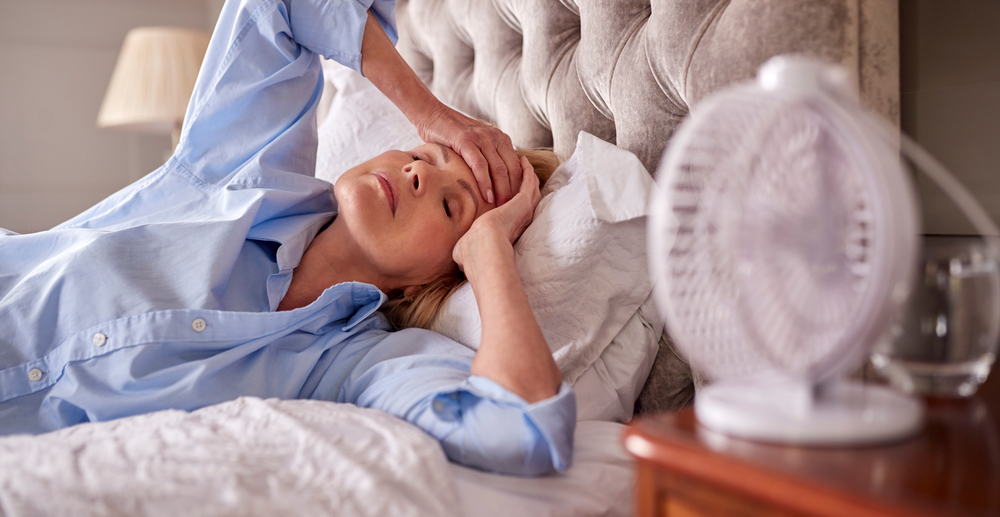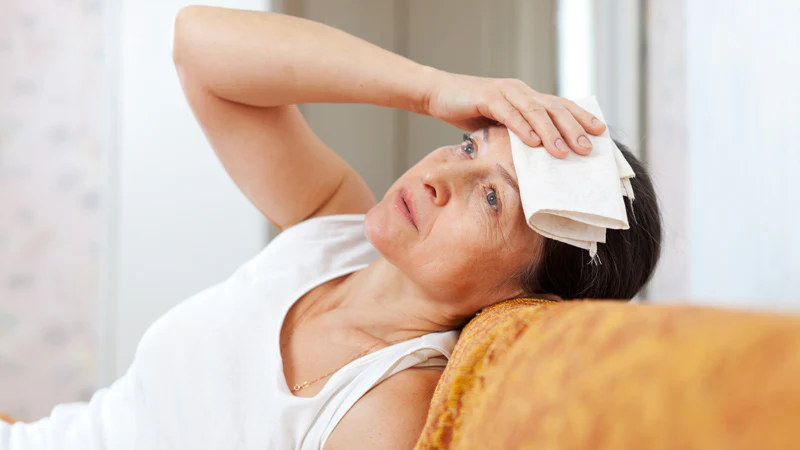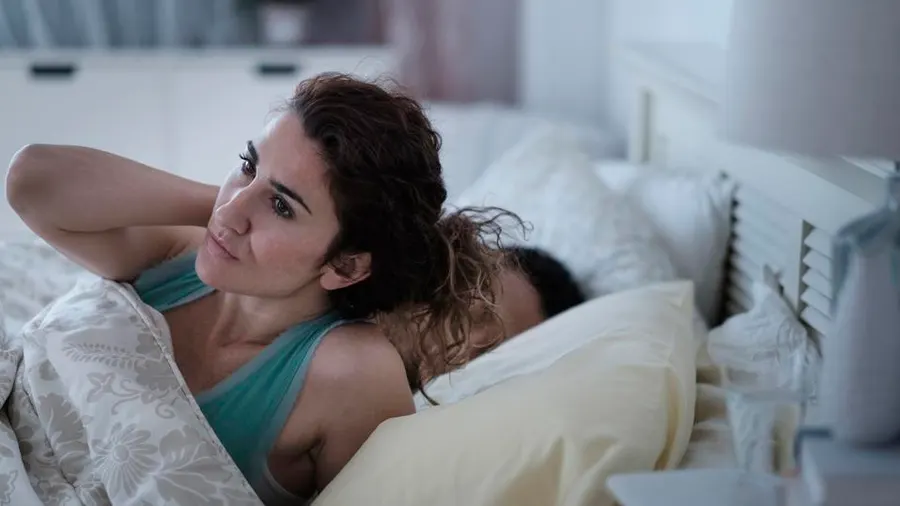Menopause night sweats can be a distressing symptom for many women, disrupting sleep and impacting daily life. Fortunately, there are effective strategies to manage and reduce these episodes. In this post, we will share various methods, from lifestyle adjustments and dietary changes to medical treatments, that can help alleviate night sweats. These options can empower women to regain comfort and improve their quality of life during menopause, ensuring better sleep and a smoother transition through this natural phase.

Contents
How To Stop Menopause Night Sweats?
Menopause night sweats can significantly disrupt sleep and decrease quality of life, but there are various strategies to manage and potentially reduce their frequency and severity. Here’s how to address menopause night sweats effectively:
1. Lifestyle Changes
- Keep Your Bedroom Cool: Maintain a cool, comfortable temperature in your bedroom and use fans or air conditioning as needed.
- Use Breathable Bedding: Opt for lightweight, moisture-wicking fabrics in both your sleepwear and bedding to help keep your body cool.
- Stay Hydrated: Drink plenty of water throughout the day to replace fluids lost during sweating.
- Manage Stress: Stress can exacerbate night sweats, so techniques like meditation, yoga, or deep breathing exercises can be beneficial.
2. Dietary Adjustments
- Avoid Triggers: Spicy foods, caffeine, and alcohol can trigger night sweats in some women. Keeping a food diary can help you identify and avoid your personal triggers.
- Eat Phytoestrogens: Foods high in phytoestrogens, such as soy products, flaxseeds, and legumes, might help balance hormones and reduce symptoms.
- Maintain a Healthy Weight: Being overweight can increase the frequency and severity of night sweats.
3. Natural Remedies
- Herbal Supplements: Some women find relief using herbal supplements like black cohosh, red clover, or evening primrose oil. However, it’s important to consult with a healthcare provider before starting any supplements, as they can interact with medications and may not be safe for everyone.
- Vitamin E: Some studies suggest that vitamin E may help reduce the severity of hot flashes and night sweats.

4. Medications
- Hormone Replacement Therapy (HRT): This is one of the most effective treatments for menopause-related symptoms, including night sweats. However, HRT isn’t suitable for everyone and comes with potential risks, so it’s crucial to discuss it with your healthcare provider.
- Prescription Medications: Other medications, such as low-dose antidepressants or anti-seizure drugs, have been shown to help with night sweats.
5. Consult Your Doctor
Discuss your symptoms and treatment options with your healthcare provider. They can help determine the underlying causes of your night sweats and recommend appropriate treatments based on your medical history and overall health.
6. Behavioral Adjustments
Engaging in regular physical activity can help manage symptoms of menopause, including night sweats, though it’s best to avoid vigorous exercise close to bedtime.
What Causes Night Sweats?
Menopause night sweats are a common symptom experienced by many women as they transition out of their reproductive years. This symptom is primarily caused by fluctuations and changes in hormone levels, specifically estrogen and progesterone. Here’s a closer look at the main factors behind menopause-related night sweats:

1. Hormonal Changes
Estrogen and Progesterone: During menopause, the ovaries gradually decrease their production of estrogen and progesterone, two hormones that regulate the menstrual cycle and also influence the body’s thermostat. As these hormone levels drop, the body’s internal temperature regulation becomes less stable, leading to sudden increases in body temperature (hot flashes) that can cause sweating during the night.
2. Hypothalamic Response
Thermoregulatory Center: The hypothalamus in the brain is responsible for controlling body temperature. Fluctuating estrogen levels can affect the hypothalamus’s ability to accurately gauge the body’s temperature. This misinterpretation can cause the body to think it’s overheated, triggering the sweat glands to produce excess sweat in an attempt to cool down.
3. Other Menopause-Related Factors
- Sleep Disturbances: Menopause can also lead to sleep disturbances, including insomnia and changes in sleep patterns. Disrupted sleep itself can contribute to night sweats.
- Emotional and Psychological Factors: Stress, anxiety, and mood swings, which are often heightened during menopause, can also play a role in triggering night sweats.
4. Lifestyle and Environmental Factors
- Diet and Nutrition: Certain foods and substances can exacerbate night sweats, including spicy foods, caffeine, and alcohol.
- Room Temperature: An overly warm sleeping environment can also trigger night sweats in menopausal women.
5. Health Conditions
Other Medical Conditions: While menopause is a common cause, other health issues such as infections, thyroid problems, or diabetes can also cause similar symptoms, so it’s important to rule out these conditions if night sweats are severe or accompanied by other unexplained symptoms.
How Long Do Night Sweats Last?
The duration of night sweats during menopause can vary significantly from woman to woman. Here’s a breakdown of what to expect:

- Night sweats typically occur during the transition period leading up to menopause (perimenopause) and can continue for several years after menopause itself.
- The exact timeframe can range from a few months to over 10 years, with an average duration of around 5 years.
- Even after night sweats become less frequent or disappear completely, occasional hot flashes and night sweats can still occur for some women.
Are Menopause Night Sweats Dangerous?
Menopause night sweats themselves are not dangerous. They are a common and uncomfortable symptom experienced by many women during perimenopause and menopause. However, they can be disruptive to sleep and overall well-being. Here’s a breakdown of the night sweats and potential consequences:
Night Sweats Themselves:
- Night sweats are caused by fluctuations in hormone levels, specifically estrogen, during menopause. These hormonal changes disrupt the body’s temperature regulation system, leading to sudden feelings of warmth and sweating.
Potential Consequences of Night Sweats:
- Sleep Disruption: Frequent night sweats can wake you up at night and make it difficult to fall back asleep, leading to sleep deprivation. This can cause fatigue, irritability, and difficulty concentrating.
- Dehydration: Night sweats can lead to dehydration if you don’t replenish lost fluids.
- Skin Irritation: Constant moisture from night sweats can irritate the skin, especially in areas like the underarms and groin.
When to See a Doctor:
While night sweats themselves are not dangerous, there are situations where consulting a doctor is advisable:
- Night sweats are severe or disruptive: If night sweats are so severe that they drench your sleepwear and bedding nightly, or significantly disrupt your sleep, it’s best to talk to your doctor for management strategies.
- Night sweats accompanied by other symptoms: If you experience night sweats alongside other concerning symptoms like unexplained weight loss, heart palpitations, or vaginal bleeding, it’s crucial to see a doctor to rule out any underlying medical conditions.
- Night sweats persist after menopause: If night sweats continue for a long time after menopause has ended (typically defined as one year without a period), consult your doctor to investigate potential causes.
Overall, night sweats are a common menopausal symptom, but they can be managed effectively. If you’re concerned about the severity, duration, or impact on your sleep, talking to your doctor is always recommended. They can guide you towards strategies to improve your sleep quality and overall well-being during menopause.
Frequently Asked Questions
How long do menopause night sweats last?
Menopause-related hot flashes typically subside after 6–24 months. However, recent studies suggest that night sweats can persist, on average, for about seven years, potentially lasting 11 years or longer in some cases.
How to stop hot flashes while sleeping?
Reduce your bedroom temperature and drink small amounts of cold water before sleeping. Adapt your bedding to adjust to your temperature fluctuations and use a fan. Dress in removable layers, ready to be shed at the onset of a hot flash.
Why are night sweats a red flag?
Night sweats can be a symptom of more than just menopause. Other conditions causing hormonal changes, like pregnancy or thyroid disorders, as well as severe disorders like certain cancers, chronic fatigue syndrome, and mercury poisoning, can also manifest as night sweats.
How do I get rid of hormonal night sweats?
Wear loose pyjamas made of natural fibers like cotton or linen, use lightweight bedding that can be removed if needed, run a fan or air conditioning in your room, regularly sip cold water throughout the night, and maintain regular daily exercise.
How do you sleep with night sweats during menopause?
Manage your environment. While you can’t control menopause, you can control your surroundings. Lower the thermostat before sleeping, use a fan, frequently flip your pillow, make use of breathable bedding materials, and wear loose sleepwear.
I am a medical student with experience and interest in Women’s health and well-being.